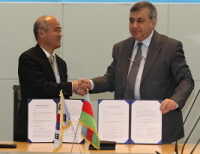Korean research reactors, home and away
26 January 2010
The Korean Atomic Energy Research Institute (Kaeri) has completed a series of upgrades to its Hanaro research reactor and has also signed a cooperation agreement with its counterpart in Azerbaijan.
According to Kaeri, newly completed upgrades at the 30 MWt High-flux Advanced Neutron Application Reactor (Hanaro) to enable it to produce cold neutrons and to incorporate a fuel test loop (FTL) system have made it into "one of the most versatile and capable in the world". Work started on the Cold Neutron Facility, which cost around 60.0 billion won ($52.3 million), in 2003, while the 24.0 billion won ($20.7 million) FTL system project began in 2001.

Azerbaijani memorandum
Kaeri has signed a memorandum of understanding with the Institute of Radiation Problems (IRP) of the Azerbaijan National Academy of Sciences to strengthen technical cooperation between the institutes. According to Kaeri, Azerbaijan is planning to make a final decision on building its first research reactor in 2011.
|
So-called cold neutrons have low energy levels and long wavelengths, and can be used for research into biological and nano-scale structures. They are produced by rapidly cooling the thermal neutrons generated in the reactor with liquid hydrogen and sending them through a neutron guide pipe to the Cold Neutron Research Facility. According to Kaeri, its new cold neutron capabilities can be utilised in the production of next-generation electronic parts, computer chips, displays and nano materials, as well as in other areas of research and development. In terms of cold neutron quality as measured by neutron flux, Kaeri said, the upgraded Hanaro is now ranked third-highest in the world after facilities at France's ILL and Germany's FRM-2 reactors.
The FTL system gives Korea the ability to carry out its own safety tests on new types of nuclear fuel without having to rely on overseas testing, an important consideration for a country that is working to boost its own overall competitiveness in the global nuclear market.
Research reactors do not generate power but can be used to produce isotopes for medicine and industry, as well as for research activities and training of personnel. Much smaller and less expensive than the reactors used for power generation, about 250 research reactors are operated in 56 countries around the world. Experience with a research reactor is valuable for any country wishing one day to establish a nuclear power program, and according to Kaeri many developing countries are interested in building research reactors of their own. The Korean-built Hanaro reactor, initially based on Canadian technology, has been operating since 1995 and Korea is vying for a place in the market to supply similar research reactors to other countries. Late last year, a Korean consortium was selected to build Jordan's first research reactor in the first overseas contract for a Korean reactor design.
Plans for Pallas?
Korea is gearing up to try to take a share of up to 50 orders anticipated for new research reactors world wide over the next 15 years. Current speculation in the Korean press suggests that the country will be renewing an attempt to secure a contract to build the Netherlands' Pallas reactor.
The Netherlands' Nuclear Research and Consultancy Group (NRG) began the process to secure construction and operation permits for Pallas, a replacement for the country's ageing High Flux Reactor (HFR), in November 2009. The reactor is likely to be built at the Petten research site. Kaeri was among three international consortia that tendered for the construction project in mid-2009, and although no winner has been formally declared, some reports had suggested a consortium of Argentina's Invap and Spanish engineering and construction group Isolux had been selected as priority partner for the project.
Quoted in the Korean newspaper Dong-a Ilbo, Kaeri director Yang Myeong-seung said that he had been informed by the NRG partner Netherlands' Energy Research Centre (ECN) that negotiations with INVAP had been suspended and that another international tender for the project would likely be carried out later this year.
"We are actively considering re-entering the bid for Pallas," Yang told the Dong-a Ilbo.
Researched and written
by World Nuclear News